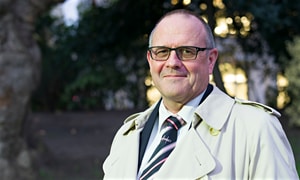Chris Norman says he needs to understand the reasons for terrorist’s thwarted plan to shoot passengers during SNCF journey from Amsterdam to Paris

In August, when Chris Norman was receiving France’s highest accolade, the Légion d’honneur, for foiling a suspected jihadi gunman on a train, he cannot have realized how, within three months, his act of extraordinary bravery would be pulled into sharp focus by the Paris terror attacks.
The British businessman became a national celebrity in his adopted country after helping three off-duty US soldiers wrestle the would-be gunman to the ground on an Amsterdam to Paris express train. Twelve weeks later, as the French capital was coming to terms with the scale of the bloodshed in the Bataclan theatre and on its streets, Norman learned that the terror cell’s ringleader was being linked with the train attacker he had confronted.
Norman says it took a day for the horror of the Paris attacks to sink in. “I was … how can I put it? Quite strongly affected,” he told the Guardian in a wide-ranging interview in which he looked back on an extraordinary year and discussed how he considers France to be changing.
The impact of the 13 November attacks on Norman deepened when he found out that he knew two of the Bataclan victims: the young restaurateurs Pierre Innocenti and Stéphane Albertini.
“Then, fundamentally you realize that you can’t let something like that stop you from carrying on living,” Norman said. Nevertheless, he admits that life has changed since the drama on the Thalys express train on 21 August, which means he is occasionally recognized by strangers.
As for personal security, he admits to having spent a bit of time with friends in the police and military “thinking of what we would do”, but adds with a relaxed chuckle: “In the end, we bought a big dog. It’s a bit of protection but there are quite a few radicalized people in the towns nearby.”
Rather, he has found himself thinking about the root causes for the behavior of the train suspect, Ayoub el-Khazzani, and cites reports that Khazzani was linked to the supposed mastermind of events in the French capital weeks later.

“What also really hit me was Paris because, a couple of times I actually said to the guys ‘this is just the beginning’, and then it turned out the terrorist we were actually involved with was driven by the same guy who was involved in the Paris attacks.
“The reaction I have now is that I need to understand why [Khazzani] was doing it. I had him in front of me and his eyes were just blank. He didn’t say a word during the whole thing. So now I am interested in finding out more about why someone would want to do it.”
That quest for answers is also shaping Norman’s business, which works with entrepreneurs in sub-Saharan Africa. “My thoughts were that I should continue to do it because, if you look at the flow of migrants for example – essentially the dispossessed who are coming into Europe at the moment – that is a hotbed for the sort of thing that happened.”
One project with which he has recently become involved is attempting to increase agricultural production in the Sahel-Sahara region, and potentially halt desertification.
Looking around his adopted country, Norman says France is in the process of changing. At his local rugby club – a personal rock of support and the place to where he was driving when he learned of the Paris attacks – he believes that some have found an echo in the Front National for their concerns.

While he has no time for the far-right party – “I was born in Uganda, grew up in Swaziland, Botswana, Zimbabwe and South Africa and left South Africa because of profound disagreement with apartheid” – he characterises recent changes in France as “not so much a question of being anti-Muslim, but being so dead tired about having to be politically correct”.
For instance, he suggests that the return of national service, though not necessarily solely in the military, could encourage civic responsibility, preparedness for emergencies and ensure that different classes and ethnicities mix more. He says his younger self would disapprove of such an idea.
Norman, who has a son on a French naval carrier currently taking part in anti-Isis operations in the Middle East, also says he is intrigued to see how powers handed to the police and military under France’s state of emergency develop.
“One of the things we were able to do on the train was taking the guy alive. You then get into the question of: ‘Did he actually tell them anything that was useful? Would he have if they had been allowed to be a bit more forceful?’ I don’t know.”
-The Guardian





